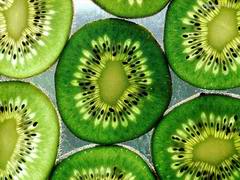语音讲解:
(点击右键“另存为”可下载语音)
课文朗读:
(点击右键“另存为”可下载语音)

It is no surprise that many people love to eat the delicious and healthy kiwifruit. But what may come as a surprise is the fact that the fruit that most of us associate with New Zealand actually comes from China.
The Chinese have a long history of eating kiwifruit. It is even mentioned in the "Book of Odes", a collection of poems more than 2,000 years old. It was not until 1847 that the kiwifruit―or "Chinese gooseberry", as it was first known―was seen by Westerners.
Yet it is Westerners who made the fruit famous. New Zealanders were the first people to plant the kiwifruit commercially, in 1934. They were also the ones to name it "kiwi", after New Zealand's national bird. From China, to New Zealand, to the rest of the world, the kiwifruit has become a truly international fruit.
--by Alex Adair/Sonya Roy
词汇小补帖:
kiwifruit奇异果
New Zealand新西兰
Book of Odes诗经
Chinese gooseberry猕猴桃
Westerner西方人
| ![]() 本网站由北京信息港提供网络支持
本网站由北京信息港提供网络支持
![]() 本网站由北京信息港提供网络支持
本网站由北京信息港提供网络支持